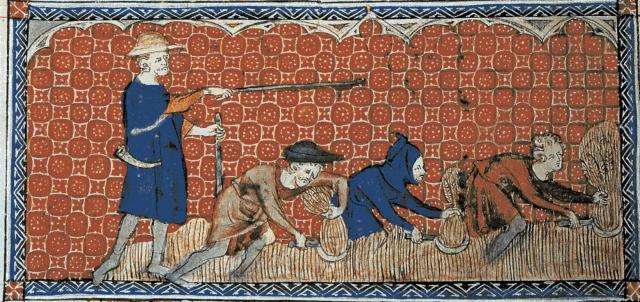Divided They Fall: How the Bubonic Plague and Serfdom Kept the Nation State of Germany from Earlier Establishment
Divided into separate
territories and cities, the empire in the 15th century was a ways
away from the modern nation we know. The hereditary order of serfdom divided social
classes creating inequality for “peasants”. There was little to no rights for
this class, leading to great tensions. This use of peasant for little reward
hindered the establishment of a “free” market. Granting rights to this lower
class could have brought about nationalism that would have stabilized
the separated governments within the empire. The peasants
were not the only peoples excluded from rights. In fact only a small portion of
the population, during this time, were considered free.
 |
| Art work displaying the oppressive nature of serfdom. |
Additionally, during
this time the cities and territories were separately ruled. Division of the
government would later prove to be a main hindrance in the establishment of a modern
central nation. Similarities can be noted between American Colonies and its British Rule. The land separation of these was an advantage of the American Rebels during the later American Revolution.
In 1450, the Bubonic plague swept
across Europe, killing nearly a third its population. The loss of valuable peasant
workers and administrators left a void in the efficiency of all aspects of the empire.
Uprisings began, farms became abandoned, and a fight over who should take over
municipal governments began.
 |
| Art expressing the toll the Bubonic plague took on Europe. |
This instability in the regional governments set
back the establishment of a central German government by decades, potentially
centuries. The
significance of this series of events could explain how the power of the German
Kings, who were emperors, did not establish a nation state. The division of
territories established and separately ruled, allowed conflict over a singular ruling entity.
In 1476 a peasant
conspiracy began. Freedom from Kings, Queens, rulers, etc. is what Hans Behiem, Piper of Niklashausen, began
preaching to peasant followers. His conspiracy to deliver his followers to
freedom was cut short upon his capture, but he sparked continuing rebellion
among this [peasant] class. Coupled
with the plague, a window of opportunity to make permanent changes
began.
 |
| Portrait of Hans Behiem |
Something to consider is how different European history would have been if an adopted modern centralized government, separation from serfdom, and continuous power of German kings would have affected thus. Advancement of countries stretching to the Americas would be forever altered. Leading countries and boundaries could have changed, and so changing the conflicts and unions there after.



Interessant, Sarah!!
ReplyDeleteGHW